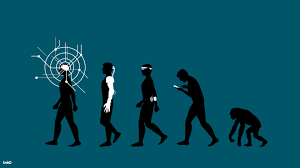Enframed
 An early memory of my childhood was my beloved hatchet. I remember the heft of the sharpened blade in my hands— which lead to many adventures, and problem solving lessons. In the woods, which were in close proximity to my house, I chopped down small pine trees, and used the limbs to build shady enclosures, concealed vantage points for observing wild life, or for reading. I loved that hatchet. That was an early beginning of my acquaintance with technology, with the tools and machines that have shaped my way of life. These devices, extensions of my intentions, efficient to achieve a desired effect, have also shaped me. From the hatchet in the hand of a seven or eight year old boy to the keyboard at my adult fingers, of this Lenovo ThinkPad—I have been existentially acted upon by the various technologies that have been at hand.
An early memory of my childhood was my beloved hatchet. I remember the heft of the sharpened blade in my hands— which lead to many adventures, and problem solving lessons. In the woods, which were in close proximity to my house, I chopped down small pine trees, and used the limbs to build shady enclosures, concealed vantage points for observing wild life, or for reading. I loved that hatchet. That was an early beginning of my acquaintance with technology, with the tools and machines that have shaped my way of life. These devices, extensions of my intentions, efficient to achieve a desired effect, have also shaped me. From the hatchet in the hand of a seven or eight year old boy to the keyboard at my adult fingers, of this Lenovo ThinkPad—I have been existentially acted upon by the various technologies that have been at hand.
A good portion of the differences in outlook and character between the generations can be attributed to the unconscious feedback-effects of the different technologies which have been available for use. The general character and outlook of my father’s generation, the so-call “greatest generation” of World War II and my generation that followed, the Baby Boomers can be traced to the tools, the techniques available to our respective generations.
This morning I began to read, The Questions Concerning Technology by Martin Heidegger. In the introduction to Heidegger’s essay I read these words by the editor David Farrel Krell.
….to insist that technology belongs to the West
in no way implies that it does not menace.
On the contrary, the question concerning the essence of technology
confronts the supreme danger,
which is that this one way of revealing beings
may overwhelm man and beings
and all other possible ways of revealing.
Such danger is impacted in the essence of technology
which is an ordering of,
or setting-upon,
both nature and man,
a defiant challenging of beings
that aims at total and exclusive mastery.
The technological framework is
inherently expansionist
and can reveal only by reduction.
Its attempt is to enclose all beings in a particular claim—
utter availability and sheer manipulability.
—–Heidegger calls Ge-stell, “enframing.”